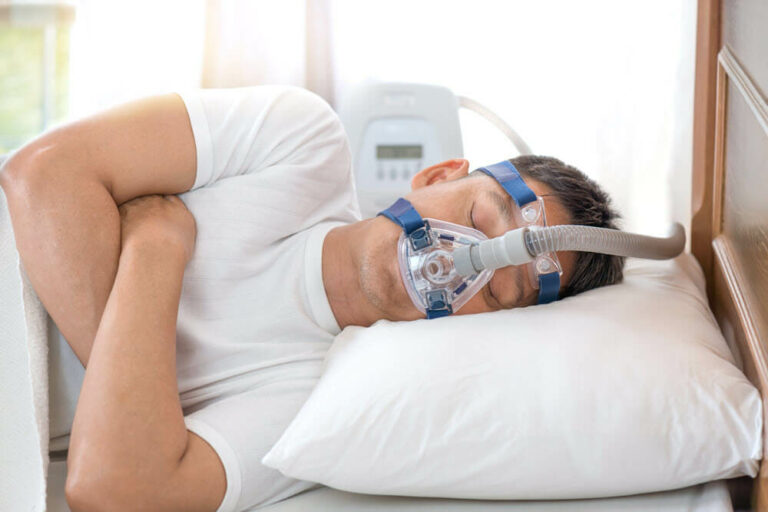A number of sleep changes occur in healthy older adults, including wake times and bedtimes changing to an earlier hour, having trouble falling asleep once in bed, experiencing sleep fragmentation, sleeping less at night, and the most important one – spending less and less time in REM and slow-wave sleep.
Although all of these sleep changes are parallel to some of the sleep problems in dementia patients, the sleep pattern shifts in people with Alzheimer’s disease or other forms of dementia tend to be more disruptive and drastic.
But, do dementia patients sleep a lot? In this article, we’ll give you the answer to this question and we’ll tell you a little bit more about dementia as well as how to help your loved ones get a night of better sleep.
What Is Dementia?
Dementia is a permanent loss of brain function, which generally has an impact on language, problem solving, memory, and other cognitive processes. In fact, in people with dementia, the brain cells don’t function as they should and they’re dying quicker than in people with no dementia. There is still no cure for dementia, but there are many available treatment options that can help to slow the progress of dementia.
Stages of Dementia
Dementia symptoms tend to worsen as time passes. The progression rate varies from person to person. Age, overall health, and family history, as well as the underlying dementia causes, play crucial roles in the progress of the disease. The progress of dementia is divided into three stages:
- Early stage of dementia. In this stage, dementia patients experience a decline in the ability to think and perform particular tasks like following recipes or paying bills.
- Moderate stage of dementia. In this stage, the dementia symptoms become more noticeable; patients can feel fear, confusion, or paranoia, as well as increased memory loss. Moods and sleep patterns can shift as well.
- Severe or later stages of dementia. Over time dementia progresses gradually and becomes severe. Severe dementia symptoms include an inability to walk, communicate, loss of control of the bladder and bowel function, and incontinence. The memory loss is so severe that your loved one cannot even recognize family members, and they need constant care from you or a professional caregiver.
Types of Dementia
Dementia has numerous different causes, and each type of dementia can cause different brain changes. There are four types of dementia:
- Alzheimer’s disease. Alzheimer’s disease is the most common cause of dementia. It usually develops gradually, and its progress is rather slow in comparison to the other types of dementia. However, the cause of Alzheimer’s disease is still not known.
- Vascular dementia. This type of dementia occurs when the brain’s blood circulation drops down as a result of a stroke or other medical problems, damaging the brain’s blood vessels.
- Lewy body disease and Parkinson’s disease. Dementia can be caused by Lewy bodies disease (LBD) and Parkinson’s disease (PD). Both of these diseases are associated with Lewy bodies’ protein deposits that develop throughout a patient’s brain, and they gradually kill and damage nerves in the patient’s brain.
- Mixed dementia. This type of dementia is caused by not only one but multiple causes. For instance, mixed dementia can be caused by harmful deposits of protein and damaged blood vessels in the brain.
How Does Dementia Affect Sleep Patterns?
The circadian rhythm consists of psychological and physical processes that control our sleep-wake cycle by responding to signals in our environment. Persons with Alzheimer’s disease or other forms of dementia experience changes in their sleep-wake cycle, which makes getting quality sleep really hard on a regular schedule.
A part of our brain that’s known as the suprachiasmatic nucleus (SCN) acts as an internal body clock and responds to signs like a light in order to signal when we should be awake and when we should be sleepy. Dementia patients usually have damaged brain cells and reduced cellular activity in the SCN.
This results in dysfunctional sleep patterns, meaning that dementia patients usually aren’t able to follow a daily sleep-wake cycle, and instead, they sleep much more during the daytime. And as a result, sleep less during the night.
Common Sleep Disorders and Issues In Dementia Patients
Sleep problems are quite common in dementia patients, and loss of sleep can contribute to (or worsen) the severity of other symptoms of dementia. Caregivers say that sleep disturbance is one of the most distressing symptoms of dementia. Determining and treating sleep problems is a crucial part of dementia care because it reduces stress for dementia patients (and caregivers) and can potentially slow down cognitive decline.
Here are some of the most common sleep disorders found in dementia patients:
- Restless leg syndrome (RLS). Restless leg syndrome is characterized by an uncontrollable urge to move the leg, particularly during nighttime. This is most common in patients with Lewy body dementia.
- Obstructive sleep apnea (OSA). Obstructive sleep apnea is a sleep disorder in which your airways collapse during nighttime, resulting in brief lapses in your breathing. This sleep disorder is most common in patients with Alzheimer’s disease. OSA is also a risk factor for developing dementia.
- REM sleep behavior disorder. This type of sleep disorder causes dementia patients to act out their dreams, in some cases, in very dangerous ways. REM sleep behavior disorder is mostly found in patients with Parkinson’s disease or Lewy body dementia. Moreover, it’s very often the first symptom of this form of dementia.
A sleep issue that also often occurs in dementia patients is sundowning. This is a phenomenon in which dementia patients experience pronounced agitation in the evening and later in the day. Sundowning symptoms include anxiety, confusion, yelling, and wandering. Furthermore, it may contribute to sleep problems, such as insomnia if these behaviors continue during nighttime. Sundowning can be caused by shifts in circadian rhythm that often occur in dementia patients, as well as depression, pain, and fatigue.
So, Do Dementia Patients Sleep a Lot?
It’s very common for dementia patients, particularly if they’re in the severe stage of dementia, to spend a lot of their time sleeping, both during nighttime and daytime. This might often be distressing for the dementia patient’s family and friends because they might be concerned that there is something wrong.
A dementia patient might find it very tiring to do rather simple activities, such as eating, communicating, or trying to understand what’s going on around them. This might make people with dementia sleep more during the daytime as the dementia symptoms become more severe.
Medications, such as antidepressants, antipsychotics, sleeping pills, and antihistamines can contribute to dementia patients’ sleepiness. Sleeping disorders not associated with dementia, like obstructive sleep apnea, can contribute to dementia patients sleeping longer, as well.
Tips for Better Sleep in Dementia Patients
If you’re caregiving to a family member that has dementia, better sleep during the night is probably a number one priority on your list. Enough sleep can be helpful for improving the health, quality of life, and mood of your loved one. Here are some tips for better sleep in dementia patients:
- Treat underlying medical conditions. Often medical conditions like sleep apnea, depression, and pain can cause sleep problems. So, you can treat these conditions and your loved one will have a better sleep.
- Make a soothing environment. Make sure that the room of the patient is set up to promote better sleep. The room needs to be quiet, cool, and dark.
- Look up side effects from medications. Dementia patients usually take quite a few medications, so it’s important to see whether some of these medications can interfere with sleep as a side effect.
- Get some sunlight. Bring your loved one outside for fresh air and sunlight after waking up in the morning because this might help regulate the sleep-wake cycle.
- Establish a routine. Maintain regular times for waking up, going to bed, and eating.
- Encourage physical activities. Physical activities, such as walks, can help promote better sleep during the night.
Concluding Thoughts
The quality of sleep gradually deteriorates as we get older. We tend to get less REM sleep, which helps us to keep our brains refreshed and healthy. So, this is much harder for persons with dementia. Even though a dementia patient can end up sleeping more than an average adult of their age, sometimes even more than 15 hours per day, it’s unlikely at all to be a quality sleep (which won’t be enough sleep for them).
Sleeping a lot can be influenced by the sleep pattern that patients have before they have Alzheimer’s disease or other forms of dementia because some of us need more sleep than others.






